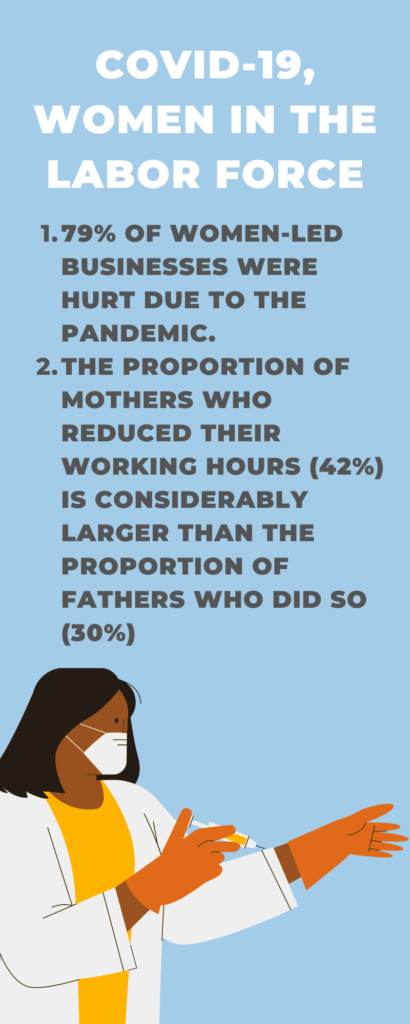By James, Nick, and Charlie
Throughout our research, we learned that women were evidently mistreated during the pandemic and have continued to face lasting consequences in some cases. For instance, throughout the uncertainties of COVID-19, the world saw a significant increase in domestic violence cases against women. Women also were tasked with more responsibilities than men and suffered consequences as a result. Increased conformity to traditional gender roles became evident as kids could not attend schools during lockdown; women were tasked with taking care of their families, cooking, clean, while also working and helping provide for their families. Due to this, women saw a more significant increase in job loss than men as they had additional duties at home, unlike most men. Furthermore, our research demonstrated that women faced enduring consequences such as depression due to the extensive workload forced upon them.

As a solution to this injustice, we recommend gender-responsive government policies that address the increasing gender inequities during the pandemic. Specific policies could be an implementation of tax and budget aid for women-led businesses or proportional aid for the disproportionate amount of women who work in fields more heavily affected by covid such as education, hospitality, hotels, and leisure.
If no intervention is exercised, we will continue to see conformity to gender roles that have subjugated women for centuries. Women will persist with taking up caregiver roles and unequal gender opportunities within the workforce at a higher rate than men. Additionally, we will see women revert back to traditional gender roles during future crises. However, we encourage the adaptability and resilience of women during times of crisis to be celebrated and encouraged within households and society as a whole. While it does seem that modern-day society is shifting in the right direction, unprecedented times such as the COVID-19 pandemic show that fear can revert people’s thinking back to conservative ways. This type of research is the exact type of intervention that can spread awareness and eliminate any further steps backward.
Throughout our research, we were left with a couple of questions that would provide more clarity on this topic:
How has the US birth rate been affected by the decrease in women’s desire to get pregnant during COVID?
Why are more women working in areas more affected by COVID than men?
This issue of inequality affects more than just one gender. We all have women in our lives that are important to us. Whether it be mothers or sisters, family members or friends, it is essential to educate ourselves about these issues and work to level the playing field for all demographics.
We learned that during times of crisis, fear and uncertainty can cause society to take steps backward. Not only for gender roles within the home but the expectations and treatment of women within the workforce. Through this course, we have seen many examples of the unfair treatment women experience in the labor market, and now we understand those issues through the lens of covid. Knowing what we know now, we understand there is a lot more to be done to help eradicate this unfair treatment. Promising steps are being taken, but its education through classes such as this one that will truly help shape the future for the better.
Sources
Croda, E., & Grossbard, S. (2021). Women pay the price of COVID-19 more than men. Review of Economics of the Household, 19(1), 1-9.
Koltai, L., Geambasu, R., Bakacsi-Saffer, Z., Barna-Petróczi, A., & Zsár, V. (2020). COVID-19 and female entrepreneurs throughout Europe. Budapest: Hetfa Research Institute Ltd
Laaraj, N. (2022). FEMALE ENTREPRENEURS IN THE COVID 19 ERA: A RETURN TO TRADITIONAL ROLES. Journal of Management Small and Medium Enterprises (SMEs), 15(1), 1-10.
Power, K. (2020). The COVID-19 pandemic has increased the care burden of women and families. Sustainability: Science, Practice and Policy, 16(1), 67-73.
Reichelt, M., Makovi, K., & Sargsyan, A. (2021). The impact of COVID-19 on gender inequality in the labor market and gender-role attitudes. European Societies, 23(sup1), S228-S245.